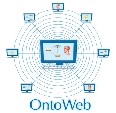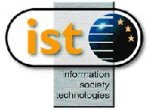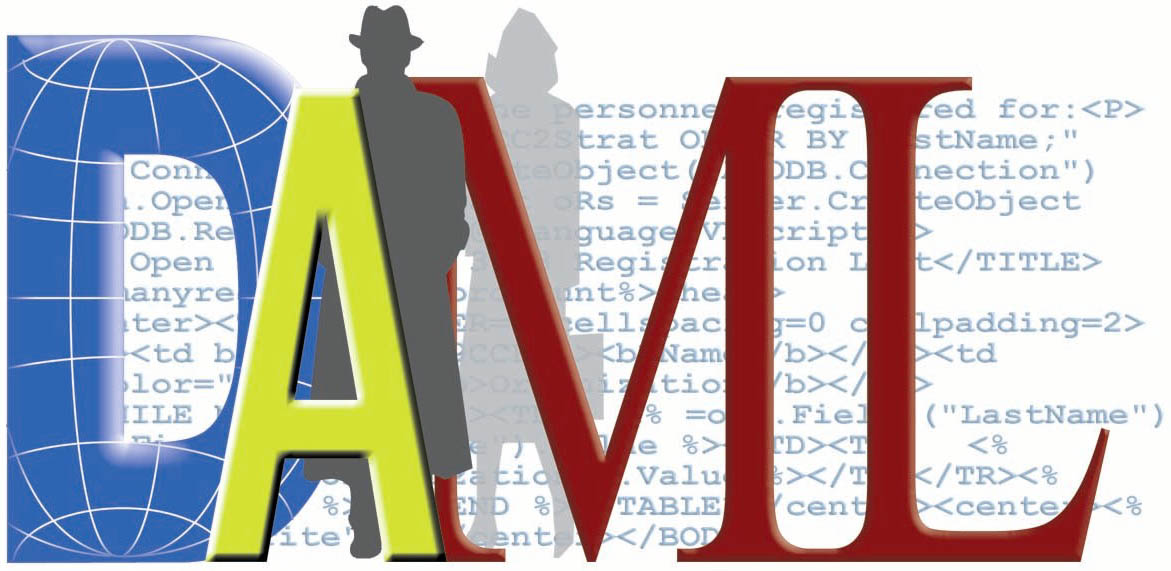Tutorials
1st International Semantic Web
Conference
(ISWC2002)
Tutorial submission is now over
June 9-12th, 2002
Sardinia, Italia
 |
supported in part by the OntoWeb
network
in cooperation with the |
 |
DARPA
 Program Program |
Tutorials will occur on Sunday, June 9th. They can last one day or
half a day.
T1: Ontologies: Representation, Engineering, Learning and
Applications
Presenters: Alexander Maedche, Steffen Staab (FZI and AIFB, Karlsruhe, DE)
Duration: half day
Prerequisite: basic knowledge about AI and information
systems.
Ontologies constitute the foundation for very many intelligent systems nowadays. The have gained popularity
for very different needs of groups like the World Wide Web community, the database community and the
machine learning community. They are applied to applications and infrastructures like the Semantic Web,
information extraction, e-Commerce, or E-Learning applications. The goal of this tutorial is to acquaint the
reader with the basics of ontologies that are used for appli-cations:
1.How are they represented?
2.How are they engineered?
3.How can they be learned?
4.How can they be applied?
It is the objective of this tutorial to communicate to the audience a comprehensive picture in order to
understand the role of ontologies in future
information systems.
Outline:
- Introduction
- Ontology Representation
- Ontology Engineering
- Ontology Learning
- Ontology-based Applications
More information: http://events.aifb.uni-karlsruhe.de/ontologytutorial/iswc2002/.
T2: Description Logics for Conceptual Design,
Information Access, and Ontology Integration: Research Trends
Presenter: Enrico Franconi ,
Dept. of Computer Science, Univ. of Manchester, UK
Duration: half day
Description logics (DL) are a very promising research area in
knowledge representation (see www.dl.kr.org). The main effort of the
research in DL is in providing both theories and systems for
expressing structured knowledge and for accessing and reasoning with
it in a principled way. Recently, basic progress has been made by
establishing the theoretical foundations for the effective use of DL
in information systems. DL offer promising formalisms for solving
several problems concerning Conceptual Data Modelling and Ontology
Design, Intelligent Information Access and Query processing, and
Information Integration.
In the tutorial I will argue that good conceptual modelling and
ontology design is required to support powerful query management and
to allow for semantic based information integration. Therefore, the
tutorial has been structured into three parts. In the first part an
extended ontology language and a methodology for conceptual and
ontology design will be introduced; a demo of the i.com conceptual
design tool will be given. In the second part the query management
problem in the presence of the previously devised conceptual model
will be considered: a global framework will be introduced, together
with various basic tasks involved in information access. In the last
part general issues about ontology integration will be presented.
This tutorial will have a popular style showing research trends,
rather than a strictly theoretical one. Its aim is to let the
audience understand why DL technologies could be useful to semantic
web research and applications, and it will mostly make use of
examples. Nonetheless, precise links to the important theoretical
results and to the relevant references will be given.
More information: http://www.cs.man.ac.uk/~franconi/dl/course/tutorial/
T3: Semantic web services
Presenters: Christoph Bussler, Dieter Fensel, Terry Payne, Katia Sycara
Duration: full day
Web Services is one of the hot areas in web technology supporting the remote
invocation of business functionality over the Internet through message
exchange. Research activities as well as industrial developments focus
on implementing the mechanisms required for remote invocation and
automation of Web Services (using standards such as UDDI, WSDL, X-lang,
WSFL, e-speak, .NET etc). Concurrently, the idea and vision of the
Semantic Web is catching on and researchers as well as companies have started
to realize the benefits of this great vision, which includes ontologies
that allow machine-supported data interpretation.
While both efforts are very powerful in themselves, their combination,
termed Semantic Web enabled Web Services (SWWS) opens tremendous
possibilities. Web services will transform the web from a static collection
of information into a distributed device of computation. Semantic Web
technology makes the World Wide Web machine-interpretable. Semantic Web
enabled Web Services, such as the DAML-S effort, will allow the automatic
Discovery, selection and execution of inter-organization business logic
making areas like dynamic supply chain composition a reality.
This tutorial brings together theories, challenges, issues, languages and
tools from the Semantic Web, Web Services and Agent Technology. We will
present the current state of the art in Web-Based Services and sort through
the increasing array of relevant tools, languages and theories both from
academia and industry. The tutorial includes an exploration of the
following:
- Current state of the art in web service research and industrial standards.
- Vision and implications of the Semantic Web and Web Service symbiosis.
- Exploration of the current work and approaches to SWWS
Overview
- Introduction to the Semantic Web and Web Services
- Web Services: The Vision & Truth
- Web Services Modeling Framework
- Semantic Web Enabled Web Services: DAML-S
- Mediation & Matchmakign
- Advertising Services
- Service Process Description & Invocation
- Discussion & Wrap Up
More information: http://www.daml.ri.cmu.edu/tutorial/iswc-t3.html
T4: Jena Tutorial
Presenters: Jeremy Carroll, Brian McBride, Andy Seaborne (HP Labs)
Duration: half day
Prerequisites: Java, basic RDF, basic DAML+OIL, a laptop, a Java
IDE
Jena is a leading implementation of RDF within Java, and is widely used by
semantic web developers.
This tutorial is aimed at the researcher who wishes to be able to start
using Jena for developing and deploying semantic web prototypes.
The tutorial is a hands-on experience with attendees expected to complete a
number of simple exercises. The exercises will form about half the content.
Attendees who already know Jena and wish to consider reusing the material to
teach others Jena are also welcome.
Goals:
After the tutorial you will be able to:
- Read and write RDF/XML and DAML ontologies from within Jena
- Create and execute RDQL queries
- Navigate an RDF graph within Jena:
- as a graph;
- using RDQL queries;
- and using a DAML ontology
- Navigate a DAML Ontology
Outline:
- Introduction to RDF as a graph
- The Core Jena API
- Query using RDQL
- DAML+OIL in Jena
More information: http://www.hpl.hp.com/semweb/iswc2002/cfp.html#more-info
The "An Introduction to Topic Maps concepts" tutorial has been cancelled. We are sorry for the inconvenience this may cause.
|
![[ Oval picture of sardinia ]](sardinia.jpg)